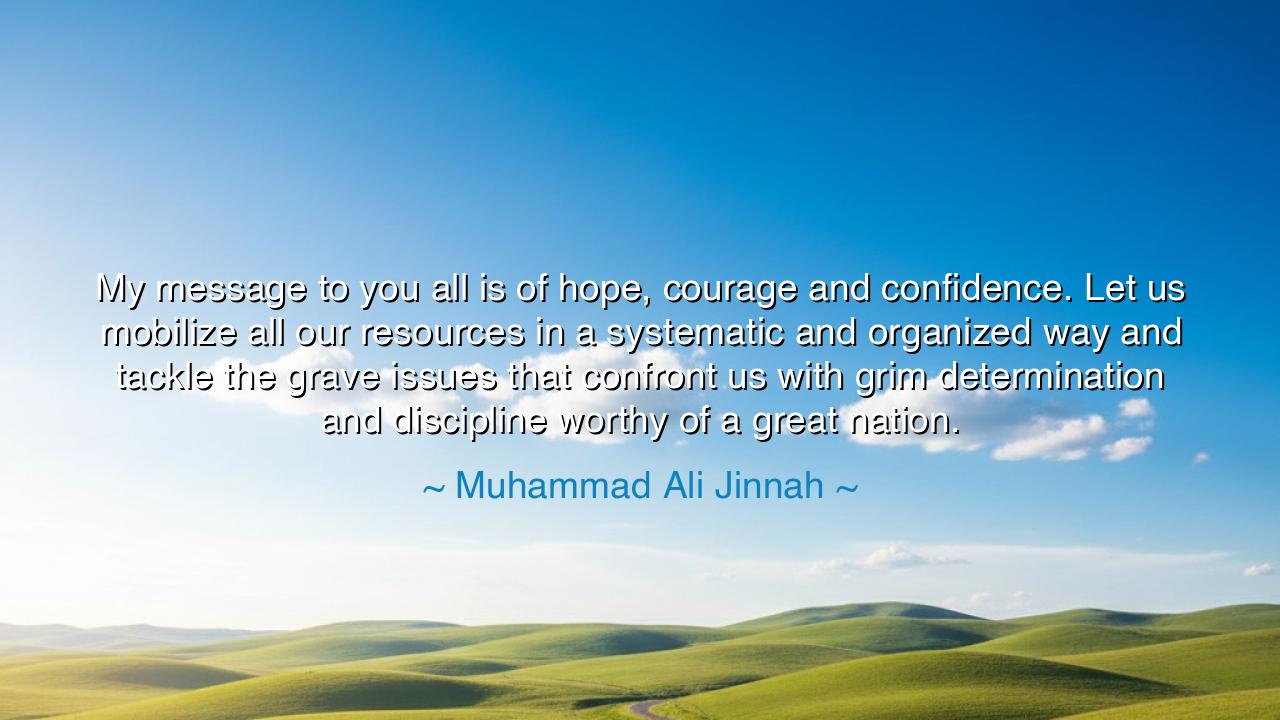
My message to you all is of hope, courage and confidence. Let us
My message to you all is of hope, courage and confidence. Let us mobilize all our resources in a systematic and organized way and tackle the grave issues that confront us with grim determination and discipline worthy of a great nation.






Hear now the words of Muhammad Ali Jinnah, the founder of Pakistan and one of the greatest architects of freedom in the modern age. He spoke not as a ruler craving power, but as a father guiding his nation toward destiny: “My message to you all is of hope, courage and confidence. Let us mobilize all our resources in a systematic and organized way and tackle the grave issues that confront us with grim determination and discipline worthy of a great nation.” These words were born from the furnace of struggle, uttered in the dawn of independence when a people, weary from division and hardship, stood at the threshold of their new beginning. In them we hear not mere instruction, but a summons — a call to rise, to unite, and to build.
For Jinnah, hope, courage, and confidence were not luxuries of the comfortable; they were weapons of the weary. He had led his people through storms — through political betrayal, famine, bloodshed, and the heartbreak of partition. Yet even then, his voice carried no bitterness. He understood that the true measure of a nation’s greatness lies not in its ease, but in its endurance. His message was not born in triumph, but in trial. In the face of unimaginable chaos, he urged his followers to hold fast to hope, to act with courage, and to believe with confidence that their efforts would not be in vain.
To mobilize all resources, Jinnah called not only for the strength of armies or the wealth of the few, but for the awakening of the human spirit. He believed that the greatest resource of any nation lies in its people — in their discipline, their organization, and their determination to serve a cause greater than themselves. He had seen how disunity and disorganization could destroy even the noblest of struggles. Thus, he taught that freedom is not secured by passion alone, but by discipline — that dreams, without structure, collapse like sandcastles against the tide. His was a vision of collective strength, of individuals bound together by shared purpose and moral resolve.
History offers us countless examples of how such a vision transforms nations. Consider Japan after the devastation of World War II — a nation in ruins, its cities reduced to ash, its people humbled. Yet, like Jinnah’s people, they rose again with hope, rebuilt with courage, and worked with discipline. In a generation, they turned tragedy into triumph, forging an industrial and cultural renaissance that astonished the world. Such is the power of systematic effort, of unity and resolve. Where chaos reigns, discipline restores order; where despair suffocates, hope breathes life anew.
But Jinnah’s message was not meant for nations alone — it was meant for individuals. For every person faces their own “grave issues,” their private storms that test the soul. His words remind us that life, too, demands organization of the mind and discipline of the heart. To overcome adversity, one must marshal every inner resource — courage to face fear, hope to endure pain, confidence to persevere when others doubt. Just as nations are built upon the will of their people, so too are lives built upon the will of the self. Those who face hardship with order and determination carve their own freedom, even in the darkest times.
The ancients knew this truth well. Marcus Aurelius, the Roman emperor-philosopher, once wrote, “You have power over your mind — not outside events. Realize this, and you will find strength.” What Jinnah proclaimed to his people, Marcus spoke to the soul: that strength and discipline are not gifts from the world, but choices of the will. Both men understood that hope without action is frail, and action without order is blind. True greatness arises when faith and labor walk hand in hand — when men and women refuse to surrender to despair and choose instead to build.
So, my child, remember this teaching: when life confronts you with its grave issues, stand firm with hope, arm yourself with courage, and move forward with confidence. Do not wait for others to organize your destiny — mobilize your own resources. Bring discipline to your dreams, structure to your purpose, and unity to your actions. In this way, even the smallest life may echo the greatness of nations.
Thus spoke Muhammad Ali Jinnah, whose words continue to ring through time. He taught that hope without courage is a whisper, and courage without discipline is chaos. To be worthy of greatness — as individuals or as peoples — we must meet our challenges not with complaint, but with grim determination, guided by purpose and fortified by love for what is right. Let his message be your own: to rise above despair, to organize your strength, and to walk forward — not as the broken, but as the builders of a better world.






AAdministratorAdministrator
Welcome, honored guests. Please leave a comment, we will respond soon